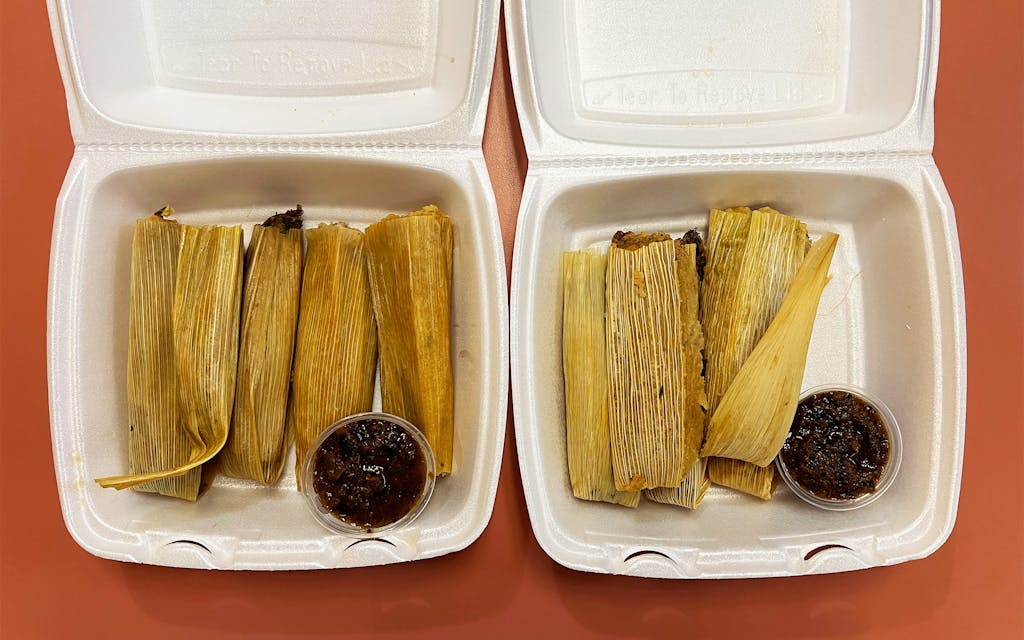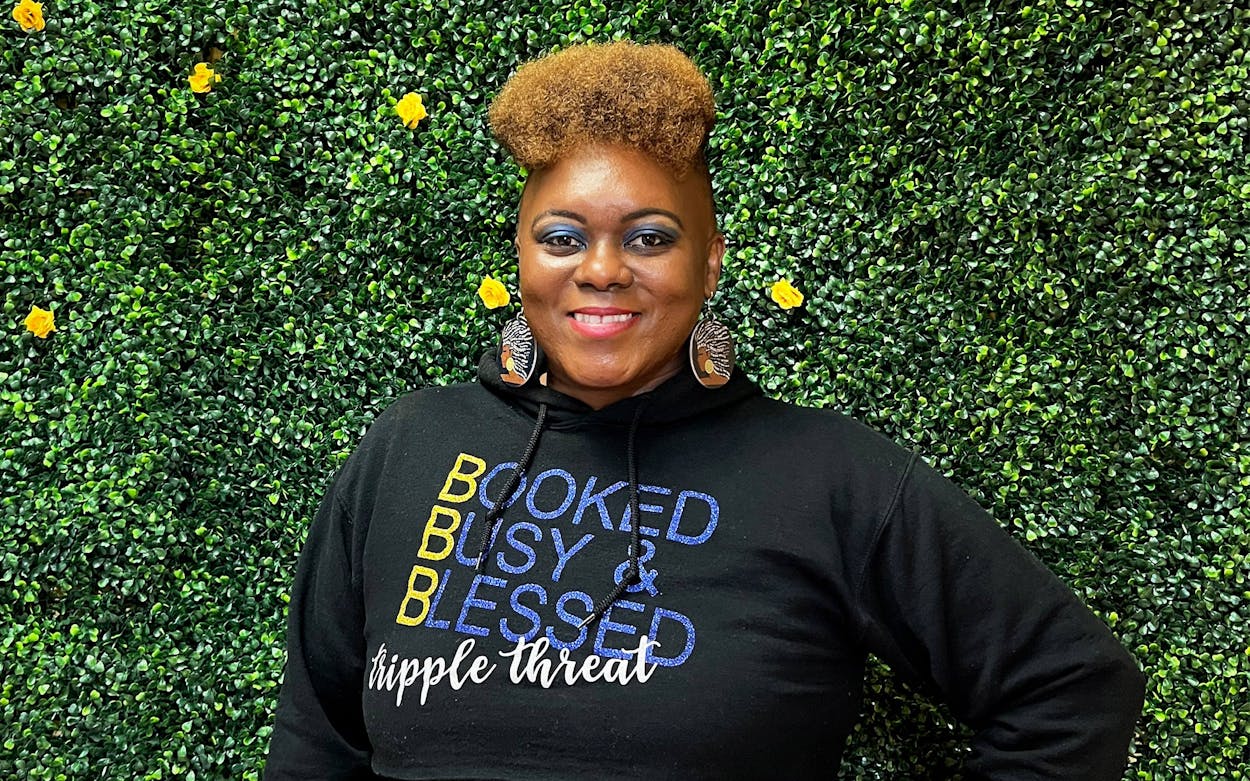The walls of Mango Deli in Houston’s Energy Corridor are adorned with affirmations like “I am worthy,” “Do your best,” and “Keep smiling, dream big.” One wall is covered in faux greenery with the neon sign “humble hustle” hanging near the top. (In fact, the word hustle appears several times across the one-room cafe.)
The phrase is the foundation of LaToya Larkin’s efforts. The 41-year-old owns Mango Deli, a cafe offering sandwiches and soups to surrounding office workers. It’s also the base of operations for Black Girl Tamales, her three-year-old commercial enterprise specializing in soul food tamales.
As far as “hustles” go, Larkin has many. In addition to running Mango Deli and Black Girl Tamales, the classically trained chef caters through her Not Enough Thyme Personal Chef Services. She also partners with G-Unity, a nonprofit established by Curtis Jackson (better known by his rap moniker 50 Cent), and Horizon United Group to mentor students at Kashmere and Booker T. Washington high schools in Houston. Formerly, she was a culinary instructor in the Spring Independent School District, where she taught cafeteria workers before moving into the classroom.
At Mango Deli, in addition to breakfast and lunch fare, you can find Larkin’s tamales in a deep-freeze case. One contains mouth-puckering collard greens and smoked turkey, while others feature saucy oxtail or shrimp and dirty rice.
Texans are familiar with standard northern Mexican/Tex-Mex tamales filled with shredded green chile pork or red chile pork. Although available year-round, tamales are most popular during the holidays, and are often purchased from parking-lot vendors or a neighbor. In the last several years, more regional varieties from Mexico and specialty options have gained wider popularity, and Black Girl Tamales is one of the most exciting purveyors around.

Larkin, an African American native of Jasper, in southeast Texas, is a third-generation tamale maker. Her grandmother, Rosa Sears, learned the craft from a Mexican friend in Southern California, where Larkin’s grandfather, a military service member, was stationed in the 1960s. When she returned to Jasper, Sears worked as a maid and taught her daughter and, eventually, eight-year-old Larkin, how to make them. “Tamales were her side hustle,” Larkin says. She adds that her grandmother’s tamales more closely resembled Mexican American tamales with steamed pork, beef, or chicken than Mississippi Delta hot tamales or the creole-style tamales sold at 86-year-old Uncle Henry’s Tamales in Beaumont.
Larkin’s tamale business started in 2019 with collard greens. She had a batch left over from a Mother’s Day brunch catering job and wanted to repurpose them. She mentioned using the dish for tamales to her son, Xavier. “Mama, you trippin’,” he was quick to reply. He urged her to stick to chicken and pork. “You got a good thing going, Mama. You just need to roll with it.” But Larkin, who chuckled at her child’s quip, was undeterred.
“Everybody makes chicken and pork tamales. There isn’t anything special about that,” Larkin shot back. Xavier, who Larkin calls her sous chef/sampler, swallowed his words along with a taste of the collard greens tamale. “Hey, Mama, you’re onto something,” he acknowledged. Larkin made samples for her clients, and the feedback was positive. Black Girl Tamales kicked off from there.
While her regular customers were excited about the new catering options and the new company, not everyone was as accepting. Some folks, Larkin tells me, have been resistant to the idea of a Black woman preparing and selling her versions of tamales. “They think I don’t know how to make tamales because I’m Black,” Larkin says. “I had a Hispanic woman teach me how to make the best candied yams because a Black woman taught her how to make them. It doesn’t matter as long as you have the know-how.” The claims of cultural appropriation, as well-intentioned as they might be, are myopic, purist gatekeeping.
Tamales are perhaps the most iconic Mexican food. The masa preparations predate European conquest. They are a symbol of perseverance, family bonds, and the depths of regional cuisine. There are triangular, peaked tamales called corundas; there are earthen-baked tamales known as zacahuiles; and there are flour masa tamales. As previously mentioned, there is a tradition of African American tamales. Larkin is working alongside that history while applying her knowledge of flavor profiles and local ingredients. Instead of appropriating, Black Girl Tamales weds the world’s greatest corn cultures: the American South and Mexico.
Larkin was still teaching in Spring ISD, and she mentioned her tamales to her students, many of whom were Hispanic. They initially pushed back on the concept, but she challenged them to think critically about food. To her surprise, they responded with ideas for potential fillings, including étouffée and red beans and rice.
Then came the pandemic shutdowns of 2020. Larkin was hoping her private chef business would pull her through the otherwise stagnant period. Instead, it allowed her to cultivate Black Girl Tamales. One Sunday morning, she remembered she had oxtails in the fridge. “I jumped out of my bed, ran out there, and I pulled the meat off the bone, and thought, this is it, soul food tamales. Everything that goes with corn bread, I will put it in tamales,” she recalls. Larkin left Spring ISD and went elbow-deep into masa with a heavy dose of faith. “This was a vision God had for me, and I had to at least see if it could work,” she explains.
Larkin’s businesses and brand are thriving. Black Girl Tamales sells not only from Mango Deli but also nationwide via the company’s website. Larkin competed in a cooking competition at the Houston Rodeo in February. In January, as part of the Goldman Sachs’ One Million Black Women business initiative, Larkin provided the bank and investment firm’s New York office with twenty dozen tamales for a holiday party. The collard green tamales are the No. 1 seller, at 100 dozen sold weekly. The other options change, but have included shrimp and grits, jerk chicken, and vegan options.
On a recent visit to Mango Deli, I shared several tamales with a friend. The collard greens with bacon had a prominent tang that joyfully ping-ponged across the palate. The shrimp and grits weren’t dry or mealy; rather, there was a sweet corn flavor buoyed by the firm shrimp. The vegan dirty rice, smothered pork chop, and oxtail tamales reminded me of my college days in the South, where there was a pig pickin’, tangles of Spanish moss rocking in the wind, and a mouth full of rich and smile-inducing dishes.








